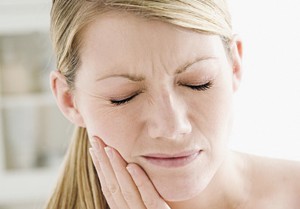By Lee R. Cohen, D.D.S., M.S., M.S. –
Many patients at some point experience pain in a tooth when biting. This can occur for a variety of reasons and may signal a problem with the tooth involved. The pain I am considering is not related to sensitivity to hot or cold temperatures, but directly to a sensation that occurs when actually biting down. This is different than a constant, dull ache a patient may feel even when not chewing.
Common Causes:
1) The first common cause for pain associated with biting can be related to a tooth that is slightly “higher” than its neighbors. This high spot will cause the tooth to be hitting its opposing tooth first as we bite down and often with more force than the rest of the teeth. In simple terms, this situation can lead to a tooth being constantly pounded on and causing discomfort.
A number of factors can lead to a tooth becoming “higher” than its neighbors. Teeth themselves can shift positions over time leading to this uneven biting. In some circumstances, recent dental work (such as fillings or crowns) may sit slightly higher than the neighboring teeth and a simple alteration or smoothing may relieve the situation.
2) Another common reason pain is often experienced during chewing is the existence of a root fracture. I am not necessarily referring to a large crack in the tooth, but a microscopic crack that may not be visible to the naked eye. These types of fractures in the tooth are not repairable and can lead to bone and eventually tooth loss.
Diagnosis of root fractures is often aided with a 3D CT scan which, if equipped, can be provided in the dental office. When the diagnosis of a root fracture is made, the prognosis for the tooth (or at least the root involved) is hopeless. Typically the involved tooth is removed. The space that remains is usually planned to have some type of replacement. Often the replacement of choice is a dental implant. In certain situations, a bridge or removable denture may be used.
 It is important to have an evaluation of a tooth that is hurting when you bite or chew. If a fracture of some kind does exist, the supporting bone around the tooth will likely be lost. This bone loss will ultimately impact the adjacent teeth leading to more involved and expensive treatment overall.
It is important to have an evaluation of a tooth that is hurting when you bite or chew. If a fracture of some kind does exist, the supporting bone around the tooth will likely be lost. This bone loss will ultimately impact the adjacent teeth leading to more involved and expensive treatment overall.
Lee R. Cohen, D.D.S., M.S., M.S., is a Dual Board Certified Periodontal and Dental Implant Surgeon. He is a graduate of Emory University and New York University College of Dentistry.
Dr. Cohen completed his surgical training at the University of Florida / Shands Hospital in Gainesville, Florida. He served as Chief Resident and currently holds a staff appointment as a Clinical Associate Professor in the Department of Periodontics and Dental Implantology. Dr. Cohen lectures, teaches and performs clinical research on topics related to his surgical specialty.
The focus of his interests are conservative approaches to treating gum, bone and tooth loss. He utilizes advanced techniques including the use of the Periolase Dental Laser (LANAP procedure) to help save teeth and treat periodontal disease without the use of traditional surgical procedures. Additionally, he uses in-office, state of the art 3D CT imaging to develop the least invasive dental implant and bone regeneration treatment options. Dr. Cohen and his facility are state certified to perform both IV and Oral Sedation procedures.
Dr. Cohen currently serves on the Board of Trustees for the American Academy of Periodontology and the Florida Dental Association. He is past president of the Florida Association of Periodontists and the Atlantic Coast District Dental Association. In addition, Dr. Cohen has been awarded Fellowship in the American College of Dentists, International College of Dentists and the Pierre Fauchard Academy.
Lee R. Cohen, D.D.S., M.S., M.S.
4520 Donald Ross Road, Suite 110
Palm Beach Gardens, FL 33418
Phone: 561-691-0020
www.pbcperio.com
Check Also
Is Your Cell Phone to Blame for That Headache?
“You’ve probably heard it a thousand times by now, but one of the most common …
 South Florida Health and Wellness Magazine Health and Wellness Articles
South Florida Health and Wellness Magazine Health and Wellness Articles




